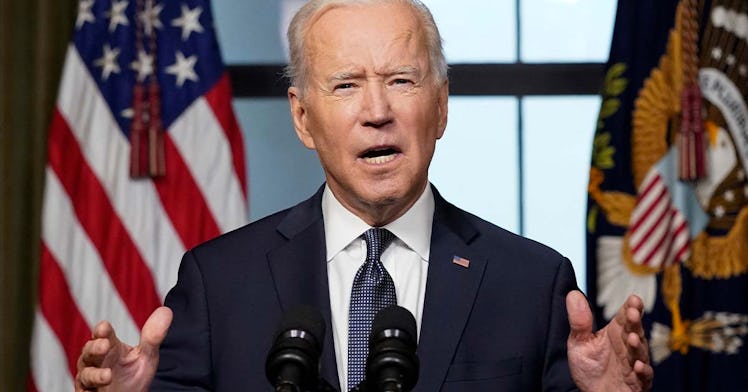Biden’s Infrastructure Package Funds Program That Creates 1.5 Million Jobs
It's not the Green New Deal, but it's a green new deal.

Included in President Biden’s $2 trillion infrastructure package is $10 billion to launch a Civilian Climate Corps. As its name suggests, the program is inspired by the Civilian Conservation Corps, a New Deal initiative that put 300,000 Americans to work outdoors.
But instead of outdoorsy work like building fire lookout towers, digging hiking trails, and planting trees, the new CCC will take on tasks designed to address climate change. A new report from Evergreen Action, an influential climate advocacy group, details just what it might look like.
What Could The Jobs Program Look Like?
Evergreen’s vision is bold. Its version of the CCC would employ 1.5 million Americans working across five focus areas: clean energy, advanced infrastructure & buildings, manufacturing, environmental remediation, and conservation, the latter of which is akin to the work of the original CCC.
It’s an expansive portfolio that includes everything from installing wind turbines and solar panels to upgrading public transit nationwide to retrofitting buildings to be more energy-efficient. And, crucially, these jobs would be good jobs in the sense that they would include health insurance through Medicare, stipends to pay for childcare, and partnerships with labor unions that would give CCC participants pre-apprenticeship education.
The new program would also be modeled after AmeriCorps, the current largest federal corps program, but be much larger and pay much more generously, with a base wage of $15 per hour. It would also be implemented in consultation with local communities, an effort to avoid the squabbles that broke out between CCC workers and locals in the ’30s.
When Will The Jobs Program Take Hold?
What we have thus far is a relatively small amount of funding in a proposed piece of legislation and the ambitious outline of a program from an influential but non-governmental advocacy organization. That’s a long way from this program become a reality, and it will certainly face heavy opposition from the GOP and conservative Democrats who refuse to publicly acknowledge the seriousness of the climate crisis.
On the bright side for proponents, 78 percent of Democrats and 84 percent of Republicans expressed support for the program in an October poll. Recent history teaches us that widespread public support is not enough to overcome the counter-majoritarian structure of the federal government, particularly the Senate, but it’s definitely necessary, as is a vision like the one Evergreen laid out for what the Civilian Climate Corps could accomplish.